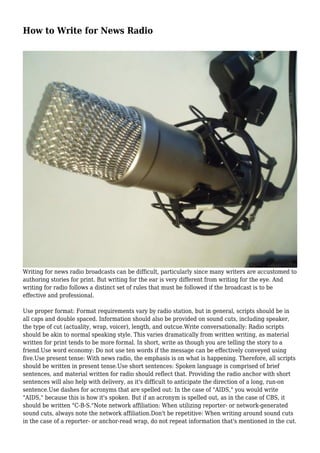
How to Write for News Radio
- 1. How to Write for News Radio Writing for news radio broadcasts can be difficult, particularly since many writers are accustomed to authoring stories for print. But writing for the ear is very different from writing for the eye. And writing for radio follows a distinct set of rules that must be followed if the broadcast is to be effective and professional. Use proper format: Format requirements vary by radio station, but in general, scripts should be in all caps and double spaced. Information should also be provided on sound cuts, including speaker, the type of cut (actuality, wrap, voicer), length, and outcue.Write conversationally: Radio scripts should be akin to normal speaking style. This varies dramatically from written writing, as material written for print tends to be more formal. In short, write as though you are telling the story to a friend.Use word economy: Do not use ten words if the message can be effectively conveyed using five.Use present tense: With news radio, the emphasis is on what is happening. Therefore, all scripts should be written in present tense.Use short sentences: Spoken language is comprised of brief sentences, and material written for radio should reflect that. Providing the radio anchor with short sentences will also help with delivery, as it's difficult to anticipate the direction of a long, run-on sentence.Use dashes for acronyms that are spelled out: In the case of "AIDS," you would write "AIDS," because this is how it's spoken. But if an acronym is spelled out, as in the case of CBS, it should be written "C-B-S."Note network affiliation: When utilizing reporter- or network-generated sound cuts, always note the network affiliation.Don't be repetitive: When writing around sound cuts in the case of a reporter- or anchor-read wrap, do not repeat information that's mentioned in the cut.
- 2. This redundancy is a waste of airtime. Instead, the lead-in should serve as an introduction to what the listeners can expect to hear.Avoid clichés or "groaners:" These phrases can be very distracting and void of meaning. And when the listener is distracted by a cliché, his attention is no longer focused on the story.Provide pronunciation guides. In the case of uncommon or difficult-t- -pronounce names, provide a notation on pronunciation following every instance of the name.Avoid "he/she" ambiguity: When referencing more than one individual in a script, always reference that person by name or title. Utilizing "he" or "she" can be confusing, particularly when there's multiple individuals referenced in the story.Ensure clarity and flow: A story that's clear in the form of a newspaper article may not be clear when spoken aloud on the air. When written, a story may also have a nice flow, but that flow is not conversational. So read all scripts aloud prior to submission.Only mention what's necessary: Lengthy, detail-inclusive stories should be left to the newspapers. News radio serves to provide only the most vital facts in a story. Including unnecessary information will waste valuable airtime and bore listeners.Do not include ages: Many writers are inclined to include the ages of individuals involved in crimes and other similar stories. But unless there is something highly relevant and remarkable about the individual's age (i.e. an 11-year-old murderer), it should be omitted. One exception is in the case of the description of a suspect sought by police. In this instance, the person's age is vital to a citizen's ability to identify the individual.Estimate when it comes to numbers: Do not mention "193 students." Instead, mention, "nearly 200 students." Exact numbers are not going to be comprehended by the listener.Write out numbers one through ten: With numbers over ten, they should be entered numerically.Downplay unconfirmed facts or unknown information: Credibility is harmed when an anchor begins a story by mentioning the information that the station doesn't yet have. Instead of beginning a story by saying, "Police have not released any information in this case," mention what is known. Then conclude with, "Additional information is expected soon," only if it's vital information that the listeners should not be without.Notably, every news organization's standards are slightly different and each radio network and affiliate has their own "house style." News radio writers should familiarize themselves with the network's standards and with the radio station's house style before beginning script work. And anything that is potentially unclear should be addressed with the reporter or anchor who will be reading the script on the air. This extra step will help limit inaccuracies and errors on the air. Visit the Resources for Writers Page for more articles like How to Find a Job as a Journalist and How to Write a Newspaper Article.